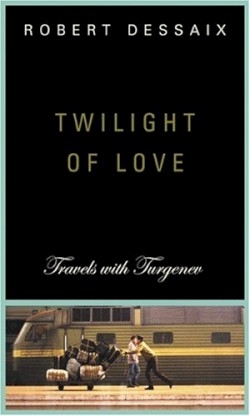Twilight of Love
Travels with Turgenev
Books—at least good ones—are time capsules. Their plotted past is an invented universe that will travel into the future, to be lodged in future readers’ imaginations as memories. It’s this intertwined conversation between overlapping centuries that sparks this memoir—part travelogue, part literary essay, part autobiography—by a popular Australian radio and television interviewer. The subject is Turgenev’s romantic life, but the theme is the illusion of love that hurls people through the world.
Unlike Dostoevsky and Tolstoy, his literary comrades of Russia’s Golden Age of novels, Turgenev (born in 1818 in Russia, died in 1883 in France) did not fill the literary firmament with high moral thunder, those heated emotions so beloved of “academics and adolescents,” as the author dryly notes. His was a more genial comet, low enough in the horizon to illuminate the small talk of hopeless infatuation, serfs, revolution, and certain death while taking tea from the samovar. (Indeed, Chekhov is just on the horizon.) Turgenev was a writer in permanent flight from his own Russian aristocratic upbringing (his insane mother, who terrorized her army of serfs, treated her son with equal inhumanity), fleeing to the civilized allures of Baden-Baden, then Paris. However, this trajectory has a modern, familiar feel, a restlessness, a sentimental attachment to origins, and a displaced longing to make peace with the past.
Dessaix (born in 1944 in Australia) follows Turgenev’s own migrations, traveling to each small posted house sign in Moscow, Germany, and France that announces “Turgenev lived here” as so many stations of the cross, each one prompting a reflection on the writer’s biography as well as the strange displacement that he himself now feels, having been an ardent student of Russian literature since “touching down at the Moscow airport in 1966 … the most thrilling moment of my life.”
Now, early in the twenty-first century, he imagines Turgenev in the peculiar love relationship that defined the last forty years of the Russian novelist’s life: living chalet-to-chalet with a famed singer and her obliging husband. Already, Dessaix is both skeptical and entranced by this erotic and sentimental attachment, poring over Torrents of Spring, Virgin Soil, Fathers and Sons, and Smoke, looking from the French writing desk to the window, straining for a glimpse of the master.
Author of several books including Turgenev: A Quest for Faith and Night Letters, Dessaix finally hears the answer: “You must reconcile yourself to loving what you find. Love is never enough. It must always be enough. There’s nothing else.” Twilight of Love is lucid, lovely, and light, as welcome as a comet passing through a sky crowded with literary egos. Reason enough to begin, as the author does, to reread Turgenev.
Disclosure: This article is not an endorsement, but a review. The publisher of this book provided free copies of the book to have their book reviewed by a professional reviewer. No fee was paid by the publisher for this review. Foreword Reviews only recommends books that we love. Foreword Magazine, Inc. is disclosing this in accordance with the Federal Trade Commission’s 16 CFR, Part 255.

